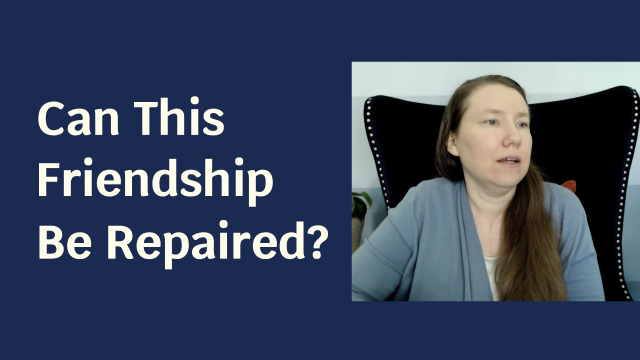
How can you heal a friendship?
LaShawn wrote to me recently and he asked the other day “My associate was frustrated because I disrespected his boundaries. He deleted my number. I was going to ask if there’s any way the friendship can be rekindled?” Okay, this is a difficult situation and I want to try and do it justice. Obviously I don’t know all the details of what’s going on here, the history between you two and all of that. So I can’t say, for absolute sure, one way or the other, but I do think there’s a potential for it.
Then where we repaired the friendship, that repair part is the most essential thing.
Sometimes people think that if we have problems in a friendship, that it means that the friendship can’t last or that it wasn’t really a good friendship to begin with, or all sorts of things. But often, those aren’t actually the case. Sometimes the deepest, most long lasting, closest friendships come from situations in which we’ve had disagreements with each other, where we’ve accidentally hurt each other, where we’ve misread cues or violated boundaries, and had arguments or had problems. And then where we repaired the friendship, that repair part is the most essential thing.
If it’s just that you keep having problems, maybe you make up but it’s not really deepening the quality of the friendship. If it’s just someone promises not to do that again, or they start acting nice to you all of a sudden, or whatnot, that may or may not be a good friendship and there are some toxic friendships that can look like that. But the difference is when you have those disagreements, you really take the time to reflect on what you’ve done, and how it affected the other person, and the other person really takes the time to understand you better as well, where it works both ways, and that’s a repaired friendship.
That’s where the really deep, long term, close friendships come from. It’s like when you break a bone, and the bone heals. When it heals well, that place where it was broken actually becomes the strongest place in the bone later on. So that’s what we’re looking for here. I have a few comments on how you can help that healing to happen, that repair to happen.
What was the boundary?
So the first thing to do is to notice the boundary you didn’t keep for the person you violated, or you said disrespected. It might be clear, they might have told you what it was or it might be obvious in the situation. It might be something that you have to figure out, depending on what’s going on. So first of all, notice what the boundary was.
And the next part, which is very, very important, probably the most important, is to understand why that was important to them. Why was that a boundary? Why did it matter to them? And, usually, when we hold a boundary it’s because we need something. That we need to protect ourselves, that we need to feel safe, we need to feel respected, or we need to feel like we have control of our own things, like if someone keeps taking our stuff.
When we hold a boundary it’s because we need something. That we need to protect ourselves, that we need to feel safe.
I have no idea what this boundary was that you’re specifically talking about, but whatever it was, why was that important to them? Often I don’t actually know the history about why that was important to them, and you won’t always know. It’s not actually necessary to know all of the history for that person. What I found helpful is to imagine why it might have been an important boundary for them. Why someone might have acted the way they did, why they might have reacted the way they did, why something might have hurt them.
And even if I don’t know for sure, if I imagine what might have been a reasonable chain of reactions for them, then it helps me to feel like this is reasonable. They’re not just acting strangely or it’s not them just being unreasonable about something.
Essentially, it makes more sense to me. It helps me make more sense of the situation, because ultimately we all have reasons behind how we act, how we do things, why we do things, or say things. It’s never completely random. Even when we don’t know the actual reason ourselves, there is a reason. So I try and imagine why the other person might have reacted that way, and that helps me to feel compassion for them, to understand their side of the situation.
Coming back together
Alright, so you figured out what the boundary is, you understand why it’s important or why it might have been important to them. The next step is to be really genuinely self reflective, and I can see that you’re starting to be reflective here. Do you really, genuinely want the relationship to continue in a way that you can honor that for the other person? That you can keep that boundary in the future? Not because it’s some new rule that you have to follow, but because you care about the person themselves?
If you can come to that place then you can reach out to them, try and make contact with them. You’ve written that they’ve deleted your number, if you have another way to contact them, you can try. If you don’t, you might have to wait to see if they will contact you at some point. Now, when I say reach out to them in another way: I want to emphasize reach out once, maybe twice, don’t keep bugging them because you want to apologize, because you want to say your piece.
If they don’t want to have contact with you, that is another boundary that they’re setting. And if you’ve gotten to a point where you want to keep their boundaries because you care about them, then you need to respect that one too. It might just mean that this friendship can’t continue or can’t continue at this time, and that can hurt. I get that that’s not a pleasant place to be in, but if you do care about them, you might have to live with that. That might change at some point in the future when they’re feeling better, when they’re feeling calmer, when they might be in a place where they’re willing to listen, but it might not.
It’s not just you and it’s not just this situation, there’s always a risk when you have two people together because you aren’t always going to understand each other.
So in essence, this friendship might be able to be repaired or it might not, but it’s going to take both of you. The other person also has to get to a point where they are open to letting you back into their life, and risking that you might hurt them again. And it is a risk, because they’ve seen that it’s happened at least once before. I don’t know if there’s more history, but there’s always a risk with any kind of interaction with people.
It’s not just you and it’s not just this situation, there’s always a risk when you have two people together because you aren’t always going to understand each other. Occasionally, you are going to hurt each other, you are going to have differences of opinions and thoughts because you’re simply two different people. We always risk that to some extent, in any kind of interaction with another person.
Especially when it’s a friendship, when you’re intending to be open to another person and risk some level of vulnerability. We’re intentionally opening ourselves up to more of a risk, and they may not be at a place where they can do that right now.
So I hope that this has been helpful for you. Even if this wasn’t, even if this friendship isn’t able to continue, doing this reflective process can give you some really good information about how you can be in your next friendship. The process of reflecting on “what do I really care about for this other person?” can help you in your interactions with the next friend, to really care about that person feeling safe and respected, and like you care about them, because you actually will a little bit more and that’s a good thing.
Even if it doesn’t work out now, I hope that this will still be a useful process to go through for yourself and other potential friends in the future. I’m sure that there will be other friends in the future because you sound like someone who really does care about other people. You’ll find other friends, and maybe this friend will work out as well.




